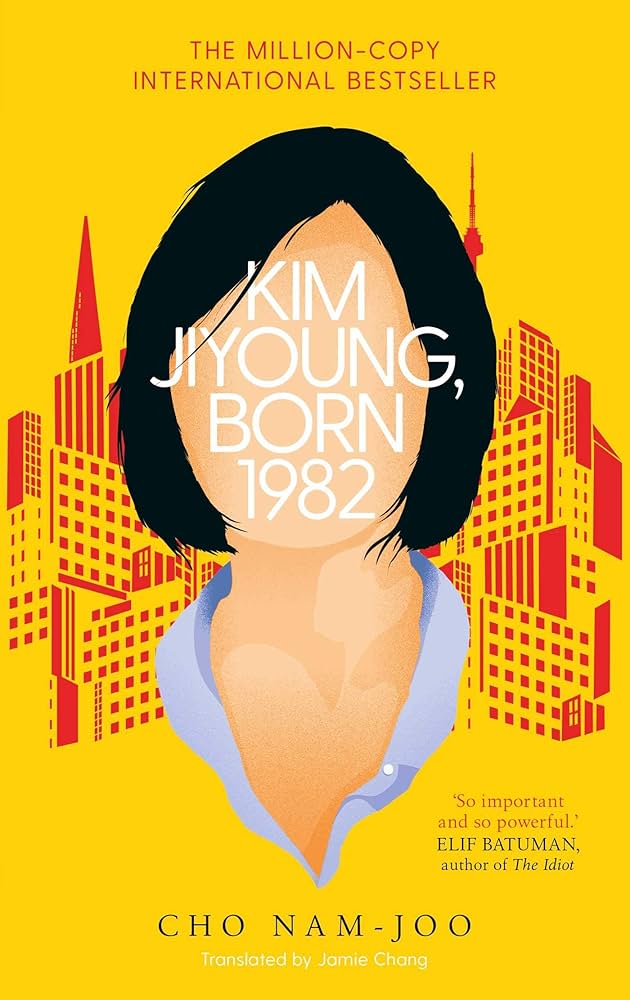
Rating: ★★★★★ (5/5)
Author: Cho Nam-joo
Genre: Feminist Fiction / Contemporary Korean Literature / Social Commentary
Ideal For: Readers interested in gender issues, Korean society, and novels that say a lot in very few words
Sometimes the most powerful books aren’t the loudest—they’re the ones that reflect your everyday life back at you, and make you sit with it. Kim Ji-young, Born 1982 by Cho Nam-joo is one of those rare novels: slim in size, but enormous in impact. It’s a piercing, deeply unsettling portrait of what it means to be a woman in a society that doesn’t quite see you. Not fully, not fairly.
Set in modern-day South Korea but resonant far beyond its borders, this novel has become a touchstone of feminist discourse and sparked conversations around the world. And once you read it, you’ll understand why.
Why I Picked It Up
I first heard about this book through the immense buzz it created in South Korea. It was widely recommended by many top Korean celebrities. It then became a cultural phenomenon and, controversially, a lightning rod in ongoing gender debates. Afterwards, I saw that it had even been adapted into a feature film starring Jung Yu-mi and Gong Yoo. That kind of reach doesn’t come from hype alone.
I went in expecting a simple story, but what I got was a mirror—a heartbreaking, infuriating, and all-too-familiar one.
Plot Summary (Spoiler-Free)
Kim Ji-young, Born 1982 follows an ordinary woman’s life from childhood to adulthood. And that’s the point—she is ordinary. One of millions. Her name is common, her upbringing typical, and her story unremarkable… until she begins to unravel.
As Ji-young enters her 30s, married with a young daughter, she begins exhibiting strange behavior: impersonating other women, speaking in their voices, seemingly unaware of what she’s doing. Her concerned husband sends her to a psychiatrist, and it’s there that her story unfolds.
Through flashbacks and clinical narration, we witness the accumulation of everyday misogyny Ji-young has endured: microaggressions, structural discrimination, emotional labor, and relentless expectations. All of these led up to her quiet breakdown.
Why It Works So Well
1. Minimalist Prose, Maximum Impact
Cho Nam-joo writes in a plainspoken, almost documentary-like style. There’s no flowery language, no dramatic arcs—just a relentless layering of injustices that speak for themselves. The emotion isn’t delivered; it’s earned, building slowly with each incident, each memory.
The narrative is interspersed with real statistics and sociological data, grounding Ji-young’s story in a wider reality. It’s not just fiction, but it’s backed by fact. And that makes it all the more haunting.
2. A Universal Feminist Story with Local Specificity
Yes, this book is rooted in South Korean society. But you don’t have to be Korean or even Asian to see yourself, your sister, your mother, your friend in Kim Ji-young. It raises the questions: Why do women always have to be the ones who sacrifice? Why is basic respect still a radical ask?
For those familiar with Korean culture, the novel offers a sharp look into its rigid hierarchies, Confucian traditions, and high-pressure workplace norms. For everyone else, it’s an eye-opener into how patriarchy manifests in both blatant and insidiously quiet ways.
3. The Genius of the Ordinary
What’s most striking is how unremarkable Ji-young’s life is. She’s not trying to rebel or upend systems—she’s just trying to live. And yet, the cumulative effect of years of being silenced, overlooked, and undervalued leads to a mental and emotional implosion.
It’s not a tragedy born of one dramatic incident. It’s in fact the slow erosion of a woman’s autonomy, piece by piece. And that’s exactly what makes it tragic.
You’ll Love This Book If You Enjoy…
- The Vegetarian by Han Kang – for literary fiction that uses a woman’s breakdown to critique society
- The Bell Jar by Sylvia Plath – for psychological portraits of women under pressure
- Convenience Store Woman by Sayaka Murata – for quiet rebellion against social norms
- I Am Not Your Perfect Mexican Daughter by Erika L. Sánchez – for exploring generational and gendered expectations
Final Thoughts: Small Book, Loud Echo
Kim Ji-young, Born 1982 is not here to entertain. Really, it’s here to reveal. It holds up a mirror to society and to the reader, asking uncomfortable questions. And then it leaves you with an ache that lingers long after the final page. It’s the kind of book you press into a friend’s hand and say, “You have to read this.”
Whether you’re new to feminist literature or deep in the conversation, this book is essential. It reminds us that behind every quiet woman who appears to be “fine,” there may be a history of unseen weight she’s been forced to carry for far too long.
Looking for more powerful books that challenge, reflect, and illuminate? Stay with us at beige-yak-991558.hostingersite.com—where every story is a conversation waiting to happen.

